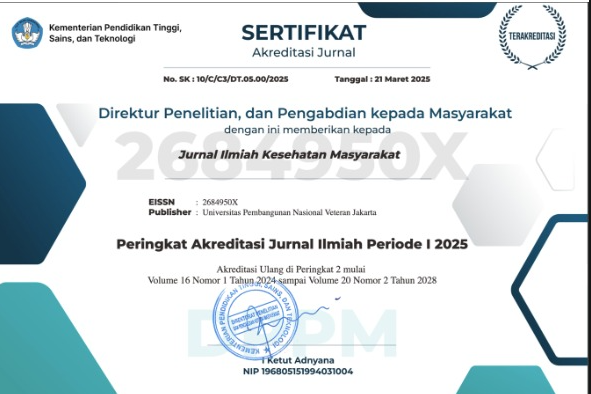Perbedaan Faktor Risiko Obesitas di Pedesaan dan Perkotaan pada Orang Dewasa di Indonesia; Analisis Data Riskesdas 2018
Abstract
Abstract
Latar belakang: Obesitas menjadi tantangan besar masalah kesehatan masyarakat global yang terkait dengan peningkatan risiko penyakit. Tempat tinggal menjadi faktor risiko paling dominan berhubungan obesitas. Penelitian ini bertujuan untuk mengetahui perbedaan faktor risiko obesitas pada orang dewasa di Indonesia di pedesaan dan perkotaan.
Metode: Penelitian ini menggunakan data sekunder Riskesdas 2018. Populasi penelitian adalah seluruh individu berusia >18 tahun di Indonesia. Sampel penelitian adalah semua individu yang memiliki kelengkapan variabel penelitian yaitu ada 467.198 responden. Data dianalisis menggunakan uji Chi-Square.
Hasil: Hasil penelitian ditemukan bahwa faktor yang berhubungan dengan obesitas di perkotaan adalah jenis kelamin (0,001), umur (0,001), pendidikan (0,001), konsumsi makanan dan minuman manis (0,001), konsumsi minuman soft drink (0,001), konsumsi sayur dan buah (p=0,017, kebiasaan merokok (0,001), aktifitas fisik (0,004), dan depresi (0,002). Sedangkan faktor yang berhubungan dengan obesitas di pedesaan adalah jenis kelamin (0,001), umur (0,001), pendidikan (0,001), konsumsi minuman manis (0,001), konsumsi makanan berlemak/berkolesterol/gorengan (0,001), konsumsi minuman soft drink (0,001), kebiasaan merokok (0,001), aktifitas fisik (0,001), dan depresi (0,005).
Kesimpulan: Faktor risiko yang berhubungan dengan kejadian obesitas di Indonesia baik di pedesaan maupun perkotaan adalah jenis kelamin, umur, pendidikan, kebiasaan merokok, aktivitas fisik, depresi, dan pola makan. Perlu adanya peningkatan program pencegahan obesitas terutama edukasi gizi seimbang baik itu di pedesaan maupun di perkotaan.
Differences of Adults Obesity Risk Factors in Rural and Urban in Indonesia; an Analysis of Indonesia’s Basic Health Research 2018
Abstract
Background: Obesity is a major global public health challenge associated with an increased risk of disease. Place of residence is the most dominant risk factor related to obesity. This study aimed to determine the differences in risk factors for obesity in adults in Indonesia in rural and urban areas.
Methods: This study used secondary data of Riskesdas 2018. The research population was all individuals aged > 18 years in Indonesia. The research sample was all individuals who have complete research variables, namely there are 467,198 respondents. Furthermore, the data were analyzed using the chi-square test.
Result: This study found that the factors associated with obesity in urban areas were gender (0.001), age (0.001), education (0.001), consumption of sweet foods and drinks (0.001), consumption of soft drinks (0.001), consumption of vegetables and fruit (p = 0.017, smoking habits (0.001), physical activity (0.004), and depression (0.002).While factors related to obesity in rural areas were gender (0.001), age (0.001), education (0.001), consumption of sweet drinks ( 0.001), consumption of fatty/cholesterol/fried foods (0.001), consumption of soft drinks (0.001), smoking habits (0.001), physical activity (0.001), and depression (0.005).
Conclusion: Risk factors associated with the incidence of obesity in Indonesia, both in rural and urban areas, were gender, age, education, smoking habits, physical activity, depression, and eating patterns. Increasing obesity prevention programs, especially education on balanced nutrition, both in rural and urban areas, is urgently needed.
References
Pérez-Rodrigo C, Hervás Bárbara G, Gianzo Citores M, et al, Prevalence of obesity and associated cardiovascular risk factors in the Spanish population: the ENPE study, Rev Española Cardiol (English Ed, Epub ahead of print 2021, DOI: 10,1016/j,rec,2020,12,020,
Corlin L, Short MI, Vasan RS, et al, Association of the Duration of Ideal
Cardiovascular Health Through Adulthood with Cardiometabolic Outcomes and Mortality in the Framingham Offspring Study, JAMA Cardiol 2020; 5: 549–556,
Landecho MF, Tuero C, Valentí V, et al, Relevance of leptin and other adipokines in obesity-associated cardiovascular risk, Nutrients 2019; 11: 1–16,
Pierobon M, Frankenfeld CL, Obesity as a risk factor for triple-negative breast cancers: A systematic review and meta-analysis, Breast Cancer Res Treat 2013; 137: 307–314,
Sommer A, Twig G, The Impact of Childhood and Adolescent Obesity on Cardiovascular Risk in Adulthood: a Systematic Review, Curr Diab Rep; 18, Epub ahead of print 2018, DOI: 10,1007/s11892-018-1062-9,
Kementerian Kesehatan RI, Epidemi Obesitas, http://p2ptm,kemkes,go,id/ 2018; 1–8,
Blüher M, Obesity: global epidemiology and pathogenesis, Nat Rev Endocrinol 2019; 15: 288–298,
Chooi YC, Ding C, Magkos F, The epidemiology of obesity, Metabolism 2019; 92: 6–10,
Kemenkes, Hasil Utama Riskesdas 2018, 2018, Epub ahead of print 2018, DOI: 1 Desember 2013,
Kemenkes, Riset Kesehatan Dasar (RISKESDAS) 2018, 2018,
Endang N, Ratu A, Dewi A, Faktor Risiko Obesitas pada Orang Dewasa Urban dan Rural, J Kesehat Masy Nas 2010; 5: 29–34,
Saraswati SK, Rahmaningrum FD, Pahsya MNZ, et al, Faktor Risiko Penyebab Obesitas, Media Kesehat Masy Indones 2021; 20: 70–74,
Syafiq A, Badriyah L, Fikawati S, Perbedaan Status Gizi Dan Kesehatan Pralansia Dan Lansia Di Puskesmas Cipayung Depok, Nutr Food Res 2020; 43: 89–100,
Saraswati I, Dieny FF, Perbedaan Karakteristik Usia, Asupan Makanan, Aktivitas Fisik, Tingkat Sosial Ekonomi dan Pengetahuan Gizi pada Wanita Dewasa dengan Kelebihan Berat Badan antara di Desa dan Kota, J Nutr Coll 2012; 1: 382–387,
Rizqiya F, Syafiq A, Asupan Serat Sebagai Faktor Dominan Obesitas Perempuan Pralansia, J Manaj Kesehat Yayasan RSDr Soetomo 2019; 5: 6,
Suryani N, Anwar R, Wardani HK, Hubungan Status Ekonomi dengan Konsumsi Buah, Sayur dan Pengetahuan Gizi Terhadap Status Gizi pada Siswa SMP di Perkotaan dan Pedesaan di Kotamadya Banjar Baru Tahun 2014, J Kesehat Indones 2015; 5: 6–15,
Kusteviani F, Faktor yang Berhubungan dengan Obesitas Abdominal pada Usia Produktif (15-64 Tahun) di Kota Surabaya, J Berk Epidemiol 2015; 3: 45–56,
Zulkarnain A, Alvina A, Hubungan kebiasaan berolahraga dan merokok dengan obesitas abdominal pada karyawan usia produktif, J Biomedika dan Kesehat 2020; 3: 21–27,
Safitri DE, Rahayu NS, Determinan Status Gizi Obesitas pada Orang Dewasa di Perkotaan: Tinjauan Sistematis, ARKESMAS (Arsip Kesehat Masyarakat) 2020; 5: 1–15,
DI A, Hubungan Depresi dengan Status Gizi, Medula Unila 2014; 2: 39–46,









.jpg)








